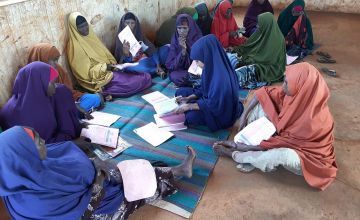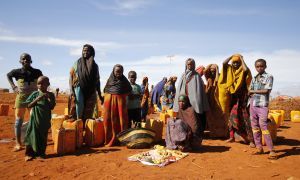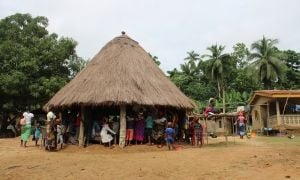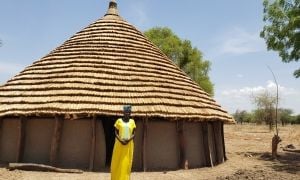
Read our 2023 annual report

Knowledge Hub
Danwadaag - Durable Solutions to Displacement in Somalia
The Danwadaag* Durable Solutions Consortium works with the Government of Somalia and communities to enhance progress towards durable solutions and (re)integration for targeted displacement affected communities (DAC) in urban centres in Benadir Regional Administration (BRA), South West State (SWS) and Jubaland State of Somalia (JSS).
*Danwadaag is a Somali word meaning 'common purpose'.

Background
In Somalia, decades of insecurity, and environmental and man-made disasters have resulted in a protracted humanitarian crisis and the internal displacement of 2.9 million people. Assisting the displaced, who face a myriad of destabilizing issues, including repeated evictions, limited access to basic services and rights, as well as inadequate housing, requires longer term solutions to enhance integration. Only by aiming for durable solutions can we enhance more self-reliance and avoid repeated humanitarian interventions for displacement affected communities at great costs.
The Danwadaag Durable Solutions Consortium is made up of the International Organisation for Migration (IOM, the lead agency), Concern Worldwide, Norwegian Refugee Council (NRC) and the Regional Durable Solutions Secretariat (ReDSS).
Sustainable Livelihoods Opportunities for Displacement Affected Communities
In Somalia’s urban areas, livelihoods are typically earned through self-employment and micro or small businesses in the informal sector, rather than through waged
employment. This is exacerbated by a lack of formal documentation and access to financial services, seeing families depend on informal mechanisms for savings and crisis response.
Danwadaag Consortium focuses on the specific economic context of the targeted communities and fosters strategic linkages to larger economic development programmes. Danwadaag's multi-sectoral livelihoods activities aim at improving financial inclusion and increasing household level income and asset bases to improve food security at household level and enhance self-reliance at community level. The focus lies on displaced affected persons and specificaly youth and women as the highest priority group to be empowered with skills, knowledge and connections into the business sector.
The strategic priorities of Danwadaag's livelihoods approach are:
- Improve capabilities and enhance asset base for vulnerable IDP women and youth for market-based livelihoods to supplement and stabilise household income.
- Create sustainable business and employment opportunities through private sector engagement to stimulate market systems plus linkages to create viable livelihood pathways for displaced women and youth in Baidoa, Kismayo and Afgooye.
- Increase the 'agency of women' to foster inclusive economic opportunities for girls and women in IDP settings for equitable participation in business and gainful employment.
Concern recognised that in order to ensure that the most vulnerable households could benefit from the livelihoods interventions, we first needed to intervene with support to limit negative coping mechanisms (such as reducing the number, quality and quantity of food consumed, selling productive assets or not sending children to school). This support ensures that targeted households can meet their basic needs to enable them to positively engage in livelihood activities. Against this backdrop, Concern under Danwadaag developed a Graduation pilot approach for Baidoa.
The Graduation model is an integrated package of support designed to improve income levels, returns on new and existing assets, address inequalities and reduce vulnerabilities to support a pathway out of poverty for the extremely poor. The Graduation pilot is under Concern's implementation and is enabled through a collaboration between the FCDO funded Danwadaag programme and the ECHO funded Somali Cash Consortium programme.
The pilot is also designed to test how a cash-based humanitarian programme and a durable solutions programme can improve their value for money by coordinating and sequencing activities to achieve longer-term, sustainable impact.
The layering of approaches for this graduation pilot, which is also in line with the Humanitarian-Development-Peace-Nexus (HDPN), is the first of its kind in Somalia. Learnings from the pilot will be used to influence future programming. If successful, it has potential to be up scaled in the collaboration between the Somali Cash Consortium and Danwadaag Consortium and replicated by other stakeholders.
This page will be updated with the results of the pilot when they are available.
For more information on the Danwadaag Durable Solutions Consortium please visit their website.
The Danwadaag programme was also featured in an issue of the Knowledge Matters magazine on Durable Solutions in Somalia in 2020:
This document covers humanitarian aid activities implemented with the financial assistance of the UK's Foreign, Commonwealth and Development Office (FCDO) and the European Union, the European Civil Protection and Humanitarian Aid Operations Department (ECHO). The views expressed herein should not be taken, in any way, to reflect the official opinion of the donors, and the donors are not responsible for any use that may be made of the information it contains.





